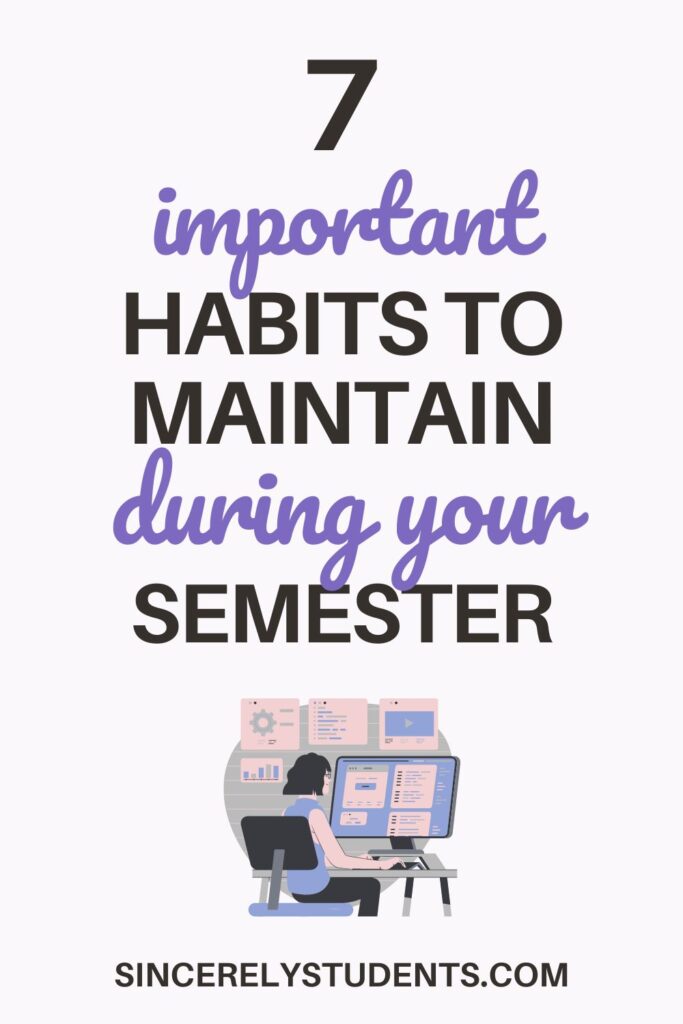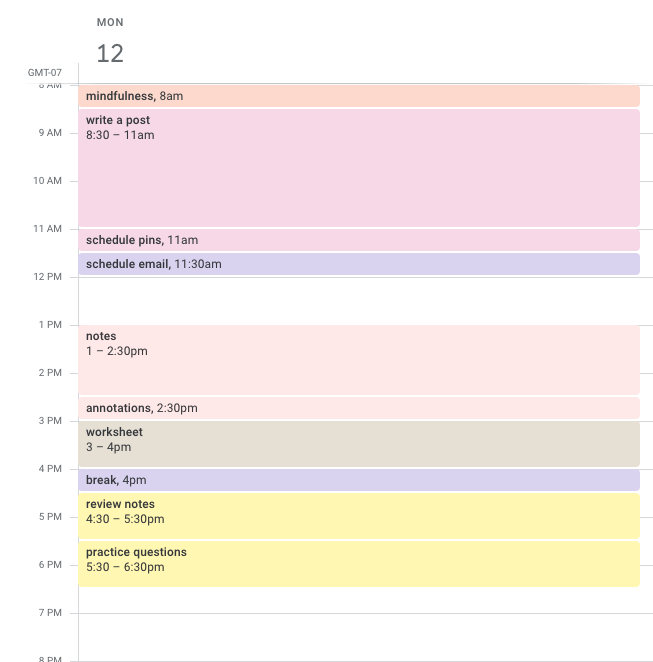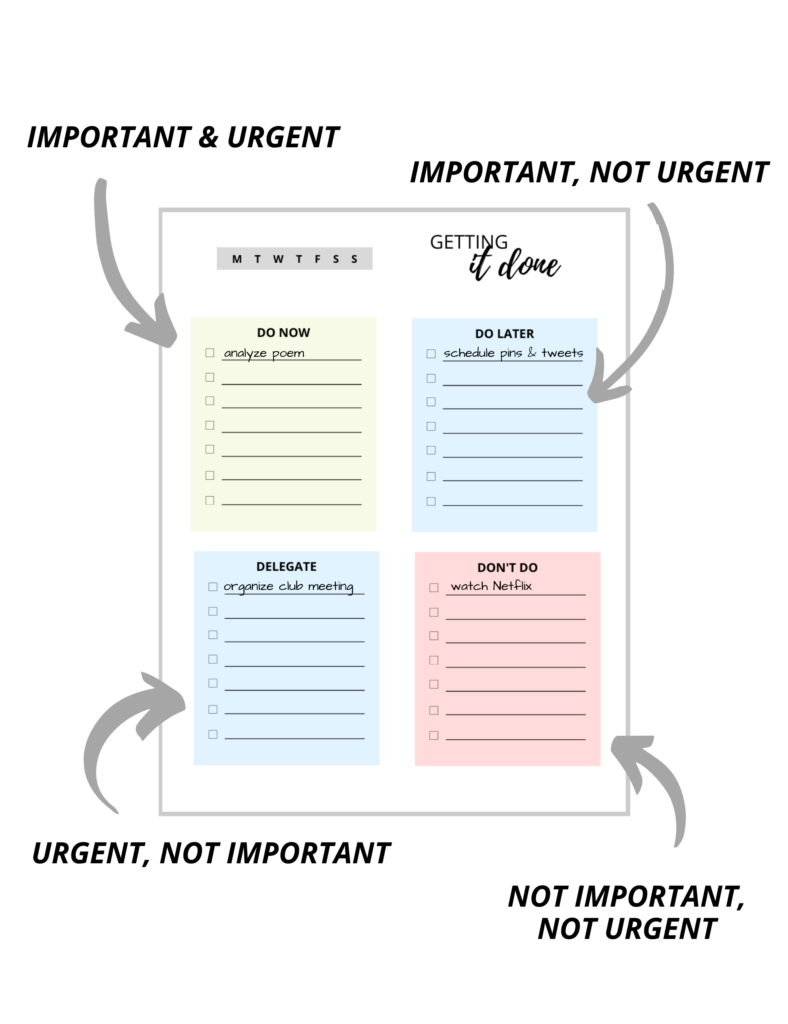It’s that time of year again– back-to-school season! While the school year can be a busy and stressful time, there are certain habits that can help make the experience a little smoother and more successful.
In this blog post, I’m sharing 7 habits that you can follow during the school year to set yourself up for success. From staying organized to taking breaks and staying healthy, these habits will help you make the most of your time and energy during the school year. So, let’s get started!

Sleep before 12AM
It’s not uncommon for students to pull all-nighters or go to bed late while trying to balance homework, extracurricular activities, and social life. However, getting a good night’s sleep is crucial for both physical and mental health, and it can also improve academic performance.
It’s generally recommended that young adults aim for at least 8 hours of sleep per night. One way to do this is by setting a bedtime and sticking to it, especially on school nights. Try to aim for a bedtime before 12AM (ideally 11PM) so that you can get a full night’s sleep. This can help you wake up feeling rested and ready to tackle the day ahead.
In addition to setting a bedtime, there are a few other things you can do to improve your sleep quality. For example, it’s a good idea to create a relaxing bedtime routine that helps you wind down before sleep. This could include activities like reading, taking a warm bath, or listening to calming music. It’s also helpful to create a sleep-friendly environment in your bedroom by keeping it cool, dark, and quiet. Finally, avoid screens (such as phones, tablets, and laptops) for at least an hour before bed, as the blue light emitted by these devices can disrupt your body’s natural sleep cycle.
Manage your time
Effective time management is a crucial skill to have during the school year, as it can help you balance your various responsibilities and make the most of your time.
One helpful technique is time blocking, which involves scheduling specific blocks of time in your calendar for different tasks or activities. For example, you might block off time for homework, extracurricular activities, and leisure time.
This can help you stay organized and ensure that you have enough time for everything you need to get done. Time blocking is super easy on a digital calendar, as you can easily move or reschedule blocks of time as needed; I use the default Apple Calendar, and many students like to use Google Calendar.

Another habit that can help with time management is setting specific goals for each day or week. This can give you a clear sense of what you need to accomplish and help you stay focused on your priorities. It can also be helpful to break larger goals down into smaller, more manageable tasks, as this can make them feel more achievable.
In addition to these techniques, it’s also important to know how you spend your time and make any necessary adjustments. For example, if you find that you’re spending too much time on social media or other distracting activities, you may need to set limits (mentally or physically on your phone) or establish boundaries for yourself.
Eat breakfast
Breakfast is often referred to as the “most important meal of the day,” and for good reason. It provides your body with the energy and nutrients it needs to function properly and can help improve your mood, concentration, and memory.
There are many different options for what to eat for breakfast, and it’s important to choose foods that are nourishing and provide a balance of nutrients. Some ideas for healthy breakfast options include whole grain cereals or oatmeal with milk, eggs with whole grain toast, yogurt with fruit and nuts, or a smoothie made with milk, fruit, and protein powder.
If you’re in a rush in the morning, there are plenty of grab-and-go options that can provide the nutrients you need. For example, you could pack a hard-boiled egg, a piece of fruit, and a piece of toast to eat on the go. Something is better than nothing!
Related Post: The Millionaire Morning Routine: Student Edition
Study right after school
Studying right after school can be a helpful habit to follow during the school year, as it can help you maintain your stamina and keep up with your coursework. When you come home from school, you may be tempted to relax and take a break, but it is much more productive to get started on your homework right away.
One benefit of studying right after school is that your mind is still fresh and you’re likely to have more energy and focus. This can help you make the most of your study time and retain more information. Additionally, by getting your homework done early, you’ll have more time to relax and unwind later in the evening.
If you struggle to focus at home, consider studying in a different location. Coffee shops and libraries are two good options, as they can provide a change of scenery and a more conducive environment for studying. Coffee shops may offer a low-level background noise that can help you concentrate, and libraries offer a quiet and peaceful atmosphere.
If you’re stuck at home, check out apps like LifeAt.io, I Miss My Cafe, and I Miss My Library (made by yours truly). They mimic the ambiance of different places to help you get into the zone and be productive.
Don’t procrastinate
Procrastination is the most common obstacle that students face, but it’s not a difficult thing to overcome. The key is to build a few strong habits:
- Make to-do lists
Try to make to-do lists every evening for the following day. This is a crucial step towards planning ahead consistently, which is an important habit to build if you want to be productive and organized. Planning ahead– whether it’s for the following day, week, month, or even year– allows you to be accountable and structured in your actions.
You also don’t have to worry about “what should I do now?”, because everything you need to do is already laid out for you, and you just have to tackle them. Usually, if you follow your to-do list diligently and complete it, you’ll have time left over to relax.
- Prioritize tasks
In addition, you must learn to prioritize and determine what tasks are the most important and should be done first. To do this, use an Eisenhower Matrix to characterize individual tasks (you can download a copy of this printout in my Freebie Library).

- “Eat the frog”
In your to-do list, there may be a difficult task that you aren’t particularly eager to tackle. However, as difficult as these tasks are, you must complete them eventually. And instead of procrastinating on them, “eat the frog”!
Find the times during the day when you are most energetic, concentrated, and productive (your peak times!), and dedicate that time to completing the most difficult task.
Go outside every day
Spending time outside can be a great way to feel refreshed and energize your body and mind. Whether it’s going for a walk or jog in the park, taking a few minutes to sit and enjoy the fresh air, or even just opening your windows to let in some natural light, getting some time in nature can help you feel more productive and alert.
In addition to the physical benefits of being outside, spending time in nature has also been linked to improved mental health and well-being. Studies have shown that exposure to nature can reduce stress, improve mood, and increase feelings of happiness and relaxation.
Especially if you’re stressed from studying or other pressures, a few minutes outside can do you good.
Recent post: 121 New Year’s Resolutions to Transform Your Life
Keep in touch with friends/family
Especially during stressful months, such as the first semester of senior year in high school, it’s easy to forget to take care of yourself. If you find that you haven’t spent quality time with others in a while, consider taking a pause– just for a day– and reach out.
Every month, or at least every quarter, make an effort to hang out with your friends or spend time with family. This can be a relaxing picnic at the park, a movie night with homebaked cookies, or a few long hours reading at a bookstore.
A day like this can recharge your energy and bring you closer to those around you. Everyone needs time like this once in a while, including you!
Conclusion
And that’s it! I hope these tips were helpful for you to become more productive this school year. Feel free to leave a comment with a habit you find most helpful in maintaining productivity during the semester.
And if you’re looking for more posts like this, here are a few related ones: